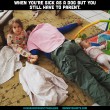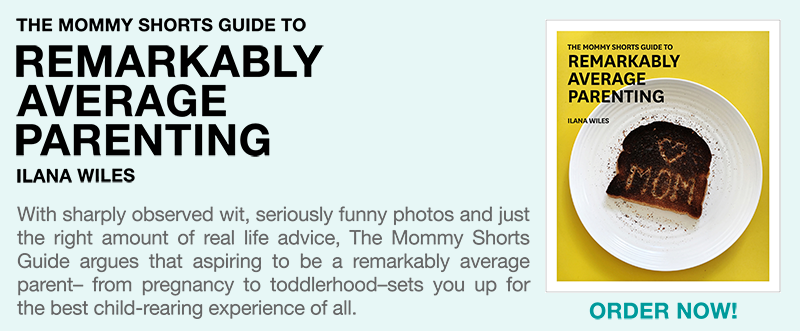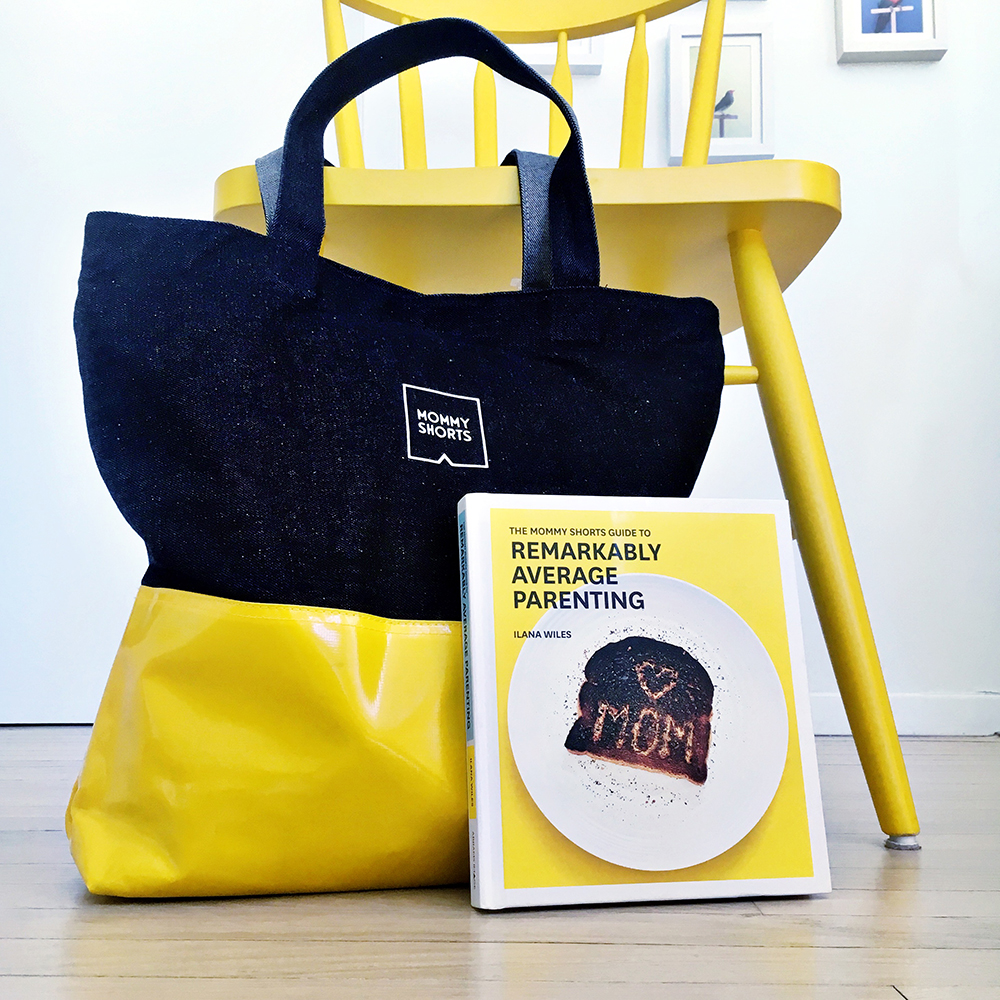
Meet Ellie. Ellie’s been making the rounds on YouTube because she’s got a very colorful vocabulary. I’m no expert but I think Ellie’s vocabulary might be perpetuated by her father’s eagerness to video tape it. Don’t get me wrong— I’m not judging. If Mazzy busted out with sonofabitch this and motherfucker that, I’d run and get my flip camera faster than you can say— BLOG FODDER! But this isn’t about Mazzy. It’s about Ellie, the foul-mouthed baby below…
To be clear, Ellie’s dad isn’t asking for help in remedying this situation. And even if he did, I wouldn’t be able to help him. But you know who can? Dr. B!
So, Dr. B— If Ellie’s dad wanted to stop his daughter from saying “fuck it”, what should he do?
Young children learn words at a rapid rate. Some researchers estimate that children learn between three to six words per day between the ages of 18 months to 6-years-old. But they often do not fully understand the meaning of a new word until they test it out, hear the word used in different situations, and observe the way people react to it.
When a young child uses a “bad word,” people often react with shock and/or amusement. So the child will often continue to use the bad word because they like that it elicits a BIG reaction. They may also continue to use the bad word because they see others (siblings, peers) get a BIG reaction from using it, because they hear the word used frequently, or because they learn the function of the word (e.g., to express angry feelings or to provoke someone).
Although children can learn a word after a single exposure, they must practice the word to fully integrate it into their vocabulary. Therefore, when children are simply parroting a “bad word” they have heard at home, it is best to ignore the behavior and stop exposing your child to swearing in the house.
If the child has already learned that the word has power and uses it to get your attention, another good strategy is to replace the word with another similar sounding word (e.g., replace “F***” with “fudge” or “F*** it” with “Forget it” or “Bucket”).
Make sure to praise your child when they use the appropriate replacement word to give the new word more “power” than the bad word. Because young children don’t know the meaning of bad words, teaching the replacement word is the same as teaching your child to correct any other incorrectly learned word. It requires time and consistency. Each time your child says the bad word, simply correct them by stating the replacement word in a matter-of-fact tone and then praise them when they repeat you with the correct word.
If you are a parent that is having trouble breaking the swearing habit, be a good role model by apologizing for saying the word and then by stating the appropriate replacement word that you should have used in the situation.
Some children learn bad words outside of the home. At around 3-years-old, children may begin to understand simple explanations for why they shouldn’t say a bad word that they have heard others use. For instance you can say, “That is not a nice word because it hurts people’s feelings. I don’t want you to use that word again” or “That’s a bad word and we don’t use that word in this house.” Some children will understand your request and simply stop using the word. While other children may use the word again to test your limits and see whether you are serious about your rules. If your child tries to test your limits, try ignoring or teaching a replacement word as explained above.
If your child is using bad words to express angry feelings or to provoke you, a very effective strategy is to remain calm, describe how they are probably feeling, and give them the appropriate words to use in the situation to express themselves. For example, “You are mad at mommy because you can’t have more cookies.” When young children are able to express themselves using appropriate words, they are using language to control their emotions and behavior which is worthy of praise.
It may seem odd to praise a child who is expressing angry feelings toward you but remember that it is much better than the alternative which may include tantrums and aggressive behavior. When you respect your child’s feelings and praise them for using their words, you may find yourself avoiding a power struggle and having a somewhat civilized interaction with your child.
What shouldn’t you do if you’d like your child to stop swearing? Laugh at it, videotape it, post it on YouTube, and play it over and over again for family and friends. Clear?
(Editor’s Note: I didn’t say it— it was Dr. B!)
If you have a question for Dr. B, our resident developmental psychologist, please email me at myshort@mommyshorts.com.

























I have to admit that my husband thought it was hilarious to teach our baby some not so nice words when she first started talking. I called my mother and told on him so he stopped his bad behavior and since then my daughter has stopped saying those naughty potty words. Thanks Dr. B for the tips, as always they are helpful.
I’m glad Dr. B said it! That’s ridic!
I am so scared my daughter is going to break out “shit” one day. It’s amazing how as a teacher for 5 years I was able to curb my language, but at home it’s like HBO. I even gave it up for Lent!
So, an appropriate replacement would be “jackRABBIT” when I’m talking about their daddy. . .
🙂
This made me laugh… when my first daughter was almost two she came out and said “For Fuck Sakes” to myself and her dad. We were shocked that she said that, and even more shocked that she even used it properly. We really didn’t get upset, but we wondered where she had heard it from. We were convinced it was the sitter… until my boss and mom both told me that its something I say all the time. D’oh! We told her that those were adult words and not for children…she eventually stopped…and I am much more careful with my word choices while little ears are around 🙂
this advice effing sucks!
kidding. I wanted to see if I got reprimanded.
🙂
Husbands always have the best ideas, don’t they? Might as well leave the child rearing in the hands of a pack of wolves.
(just kidding, sweetie!)
(no, no I’m not not.)
I’m pretty bad myself. I’m trying to channel my swearing through writing. But the shit spills over into real life all the fucking time.
Hmmmm. Not sure what people would think if our kid started calling your husband a jackrabbit. Is it just me that goes to a healthy sex life with that one?
The ole “Blame the Sitter” trick. I’m personally in favor of blaming the baby for misplacing my things. Can’t find my keys? I’m not forgetful, Mazzy must have moved them!
Mess with Dr. B and I will hurt you. Through blogging! It’s very painful, I assure you.
A hint that also works that if you find yourself saying an off-color word in front of your child, as soon as you realize it, quickly yell “watermelon!”. it distracts them and they forget the original cuss. yes, i’m serious.
You are seriously gunning for Dr. B’s job!
OK, not that I didn’t find Ellie’s enunciation clearly impressive and amusing, but c’mon, Dad. While there’s no need to call CPS, who knows what some parents will stoop to for that 15-minutes of SM fame.
Well, on the not-so-bright-side, me and my brethren will be assured business for years to come re: these parenting “foibles.”
P.S. Your kids are too cute:)
When my oldest was about two she overheard my husband say, “Oh fuck.” For about a week after that she would periodically look at him and say, “Hey daddy. Oh fuck, oh fuck.” It was such a proud moment.
At least with a pack of wolves the kids wouldn’t be speaking bad words.
A friend has three boys and the older two think its funny to teach the younger one bad words. (big gap)
So we are leaving a school fundraising meeting, the three yr old is standing at the door impatiently ..
and yells, ok you bitches, are we out of here yet?
This was at a Lutheran school church fundraising meeting 😉
I have yet to swear in front of my kids which is amazing, totally … they are 13 and almost 9!
Hahahahahahaha.
The video almost killed me. But I know if it were my kid I would NOT be pleased. Thanks Dr. B. Will keep your tips in mind should we stumble upon this little problem.
I love this idea.. but i dont think my husband will go along with it… he says “oh shit” all the time.. my two year old is statring to say it. 🙁 i always have to remind him not to use bad word…
Children are born with an innate ability to learn language. However, learning to differentiate between good and bad words takes time. So, along with good words, they pick up a few bad ones as well.
https://www.parentcircle.com/article/what-to-do-when-your-child-uses-bad-words/